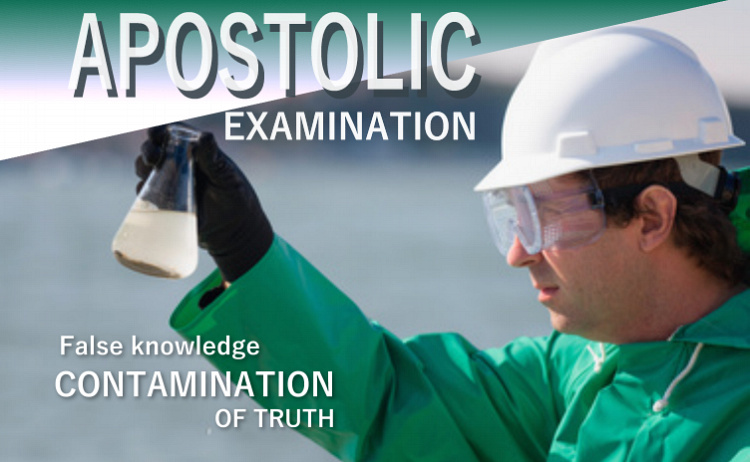
Author:
Apostle Eric vonAnderseck
Eric serves as a called and confirmed Chief Apostle in the restored government of God. He is the founder of s8w Ministries, and it is through his stewardship that God ushered in a new season of restoration for all believers who desire to walk in the fulness of Christ. View my profile.
For the first time it appears that the Holy Spirit is getting through to ministers as they are now confessing to have mixed false knowledge into truth and to have presented this impure, contaminated gospel to the people to be consumed wholesale. Now we’re getting down to brass tacks. Take a moment to let this sink in because this is a turning point.

In his article, “The Western Church Has Adulterated the Gospel”, Michael Youssef makes it clear that he took part in forming and applauding the adulteration of the gospel of Jesus Christ. When he says, “We must not exchange the truth for a lie”, he’s including himself—he has done this. When he denounces the mixing of man’s philosophies, traditions, and doctrines into Christ, it means he’s again including himself—he has done this—he has mixed false knowledge with truth, thus contaminating the gospel.
I know I promised you a teaching on the spiritual mulligan that ministers are pulling out of their hats these days, but I want to first point out something of tremendous importance, and that is the admission that truth has been contaminated, and God is rebuking that gross error because He had given to His apostles truth that was pure, meaning nothing of man added and nothing of Jesus missing.
This is actually the most important transition points, which I bring out in my book “The Apostolic Calling & Anointing” that ministers have fought against for the past 40 years
So the record of man had been the culprit. However, not knowing what the record of man is and not knowing what the record of Christ is, no distinction can be made for Christ, and despite Youssef’s best efforts, faith continues to reflect this admixture of the traditions of man into the gospel. How far can a minister go in his repentance when stating that he has been part of the impure gospel, promising to show the way, but continuing to preach the record of man?
Getting to the Root of Partial Truths
Ministers who had lingered behind and have not been a part of the transition had been defending their mixture of their own record into truth by saying that they cannot know truth as a whole, that God does not want them to know truth as a whole frame of knowledge
The following is a quote from my new book, “The Apostolic Calling & Anointing” , pages 116-117:
It comes as a surprise to most to learn that while God had placed diversity in His gifts of grace, He had not placed diversity in truth; and as the church is now coming into one doctrine under the stewardship of apostles, believers are again recognizing the light yoke of Jesus’ truth. They have entered into the fulness of Christ, and the fulness of Christ is a huge departure from partial truth(s), which we are now going to talk about to get at the root of that wrong thinking.
There are a few choice words that ministers use to get around the commandment of God, that we love Him by abiding in the one doctrine of Christ. One of those words is “truths”. That is, truth in the plural rather than the singular.
Jesus said, “I am the way, the TRUTH, and the life.” (John 14:6) Notice that truth is in the singular, not the plural. Jesus did not say, “I am the truths”, but rather, “I am the truth!” Truth is singular because Jesus was talking about Himself. He is the record of our faith. He is the pattern for our faith. He is the coin of God’s kingdom.
God is challenging the idea that partial truths are the same as the whole truth. God is challenging the habit of ministers to compartmentalize truth into categories that do not relate or tie into each other. One minister might share his ideas about worship, another will teach his ideas about prophecy, and another will teach about how he feels we should hear the voice of God. Another will teach about how he believes spiritual warfare works, another will present his own set of keys to living in God’s will and purpose, and another will present his set of keys to building the kingdom. And they all claim the mantle of God’s anointing to have passed on to them.
The very idea that it was possible to know truth as a whole was beyond the realm of possibility for ministers whose habit was to pocket truth for themselves. They look at truth as being exploratory. While claiming that all things are possible with God, they had assigned doctrinal unity an impossibility because it was not actually what they wanted. What they wanted for the church was different than what God wanted for the church, yet they continued to insist that they are the voice of God to the people. [End Quote]
Who Is Claiming The Benefits Of A Spiritual Mulligan?
The following is a quote from my new book “The Apostolic Calling & Anointing”, page 87: It’s easy to say something that is true about man’s impulsive nature to use himself as the template for faith, calling it his inner GPS, but as I pointed out earlier, [John] Bevere did not shed light upon the faulty GPS itself.
To his experience, repentance offers a “do-over” button, and so yes, he’s building from the false perception that all he needs to do is repent –start from this point to make changes, to make things right. He thought that God’s rebuke to him was a rallying point to get others on board with his message. He thought God was allowing him a spiritual “mulligan”—a second chance to get it right.
This sports term (mulligan) hits the nail on the head. Originally, the mulligan was a golf term that allowed a golfer to take another swing after an initial failure or blunder. Let’s say your first swing landed in the woods. If you’re playing an informal game among friends you get the benefit of a mulligan—another chance to take the same shot—to try again after a failed attempt. Of course, the mulligan is not really part of the game of gulf, it’s not part of the official rules, is it? And there’s a reason for that.
Why doesn’t God allow the benefit of a spiritual mulligan to ministers who want to start over? Because they have been making up the rules (terms of the new covenant) as they go along and they want permission to keep on doing that, harming themselves and all those they teach.
They’ve said all along that the doctrine of Christ cannot be known, that their relationship with God was more important than doctrine, and that they are happy with imperfect knowledge. Having disrespected God by casting off His stewardship and truth, they are happy to continue on repeating the same mistake, claiming a mulligan each time.
God is not giving ministers a green light to start over (to repeat their mistakes). God is giving them a red light, which means to STOP! You cannot build My kingdom with the GPS you’ve been using. You need to be instructed by the steward I’ve called and anointed. I’ve placed My name upon him; him shall you hear for he is My voice to you.
If you find yourself saying, “I’m just a little off target”, you might also be thinking, “Maybe I can just adjust my sights and get back on target. I’m seeing more clearly now, that what I thought was the will and purpose of God was not the will and purpose of God after all. I can adjust my sights.”
If this has happened to you, you’re not just a little off target – you bought into the false gospel, hook, line, and sinker, and now a serious cleansing needs to take place. We hear it from ministers all the time as they share God’s revelation to them. God is speaking of sweeping changes. God is saying that the way they have been doing church will radically change.
Why Repentance Is Not A Starting Point For Building
Let me repeat, repentance is NOT a point at which you can begin to build. It is the point at which grace is awakening you; it’s a stopping point. It is a gift of God to begin to see the error of your way, that Satan had you building God’s kingdom with your aspiration, principle, and imagination.
The following is a quote from “The Apostolic Calling & Anointing”, page 69: Bevere claims that his own ministry missteps were much like that of Judas; he started out with good intentions, but now is left wondering where he got off track, as God had revealed that the things he ministered were not from Him. The honesty of the minister is meant to be refreshing, but it is kowtowing. He is lowering himself to leverage respect.
This minister broke open this Pandora’s box simply because he had misinterpreted the grace of God to draw him into the transition. As I said earlier, the grace of God brings with it enormous clarity. When a sinner experiences grace, God lifts the veil of ignorance so that He can bear upon the mind that he is without Christ. Under the influence of grace the sinner sees his true condition.
In the same way God sends grace to lift the veil of ignorance for ministers to see their true condition—that what they believe is not authorized by God, but is outside of God’s sanctification and must be corrected, and the time for correction is now. But the grace to see one’s true condition is not the knowledge a minister needs to go forward.
It is easy to confuse the clarity of grace for salvation with grace for calling, but the two are not the same. Ministers believe that the same clarity to know what they know now (that they aren’t preaching the truth, that they had missed God and that they didn’t see their misstep, and didn’t see how far they had wandered from the cross of Christ) somehow means that God will now give them the right course to follow.
This is where his math does not add up. You’ll notice that Bevere’s teaching does not clear the path for building, he only cites where he went wrong and how wrong he was. He did not receive any building blocks from God, and so he offers repentance as a building block. And that’s what a sinner does, not what an apostle does. A sinner who is not in covenant with God tries to build with God through continual repentance. This is one of the many errors God has corrected in the church today through the true apostolic calling.
Many ministers, as Bevere, believe that to be rebuked means to be corrected, but that is not the case. To correct someone you have to give them another set of knowledge to change their ways. Can you see that there’s a difference between receiving rebuke and receiving correction? A minister might say, “Well, God’s not through with me yet!” Or, “I’ll grow through the fire of this time of cleansing! I’ll come out a better person for it!”
Along with that, you’ll find that ministers want to make themselves the example by saying, “I’m not afraid to say I’ve made a lot of mistakes. You can learn from my mistakes as a mother or daughter.” The minister says that you can benefit from her experience, but she isn’t speaking of her experience with Christ, rather her experience in the kingdom of darkness. She’s making herself the blueprint and record for your faith to follow rather than Christ.
Using Caution For Discernment
Ministers have used “caution” for discernment, but God calls them out saying that they are slow to repent. Their system of repentance is not the same as God’s system of repentance. Ministers like Bevere and Youssef claim repentance as a place from which they intend to build, but God is saying that they are slow to believe and in reality, intend to continue doing what they are doing, claiming the benefits of a spiritual mulligan.





